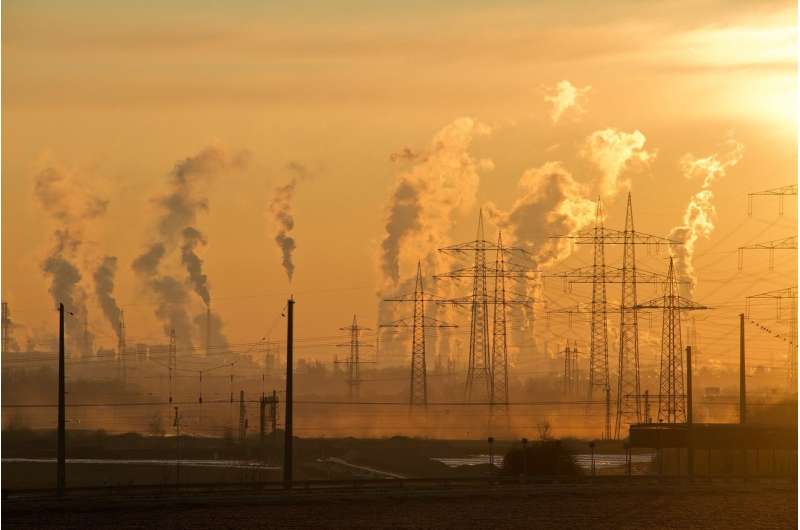This article has been reviewed according to Science X's editorial process and policies. Editors have highlighted the following attributes while ensuring the content's credibility:
fact-checked
trusted source
proofread
UK air pollution regulations will reduce deaths, but do little to protect ecosystems: Study

Existing air pollution regulations will reduce thousands of premature adult deaths in the UK, but even the most effective technically feasible actions, which will save thousands more lives, will do little to protect the country's sensitive ecosystems, find UCL researchers.
The new research, published in GeoHealth, found that existing air pollution regulations could avoid 6,751 early deaths among adults in the UK by 2030 compared to if no regulations existed. That estimate nearly doubles to 13,269 avoided adult premature deaths if all possible technically feasible measures are employed to reduce air pollution immediately.
However, existing regulations don't cover most of the pollution emitted by the UK's agriculture sector, whose emissions are predicted to rise in the coming years. The study found also that even if all technological measures are put in place, above what is required by UK law, it won't reduce the harmful effects of air pollution on the country's sensitive ecosystems.
Lead author Dr. Eloise Marais (UCL Geography) said, "Our study demonstrates that existing legislation and regulations already have a sizeable benefit on health, but more ambitious adoption of readily available measures, especially for livestock farming and fertilizer use, could benefit thousands more.
"Currently the UK government only provides a handbook of suggested farming practices to limit ammonia emissions. Many of these are the same measures we test in our study. We hope our results provide the incentives needed to regulate rather than suggest."
Human health
Air pollution is harmful to human health and damages the environment. The researchers estimated that 48,625 adults die prematurely each year in the UK due to particulate matter pollution. Presently, 79% of the UK exceeds the World Health Organization's (WHO) annual mean guideline for safe fine particulate matter levels.
The researchers looked at a range of pollutants and their effects on people and the environment, and calculated their projected effects in the coming decade based on present levels of regulation. They then went further and estimated what the maximum possible benefit could be if all technically feasible technologies were implemented.
They found that the amount of fine particulate matter in the atmosphere, the air pollutant most harmful to human health, can be significantly reduced. Existing legislation targets the emission products of many sources, including shipping, aviation, road and rail transportation, power plants and industry.
With existing regulations, the extent of the UK that exceeds the WHO guideline is expected to decline from 79% currently to 58% by 2030, but could drop to as low as 36% if all technically feasible measures were put in place.
These additional measures include low emission manure spreading methods, air filters on animal housing, alternatives to urea-based fertilizer, further desulfurising fuels, more effective air filters in industrial and power plant stacks, more efficient home stoves and boilers, and stricter auto emission standards.
However, ammonia emissions, which account for about a third of overall UK particulate matter pollution, mostly originate from agriculture which is largely unregulated. These emissions would slightly increase under current regulations and will only moderately decrease with adoption of readily available measures. Given this, the authors also explored the effects of NH3 pollution on sensitive habitats in the UK.
Environmental impacts
Air pollution damages the sensitive environments that make up the majority of UK national parks and other protected areas, but this ecosystem harm is more difficult to mitigate.
Agricultural ammonia is an especially important issue for sensitive natural habitats because it dumps excess nitrogen into ecosystems that thrive on low amounts of nitrogen, shifting the makeup of the ecosystem. Ammonia is also directly toxic to many lichens and mosses, which are important for peat formation, flood regulation and as the basis of natural food chains.
Already, an estimated 95% of the land area covered by sensitive habitats—nearly all land in the UK that isn't urban or used for intensive farming—is exposed to excess atmospheric nitrogen pollution.
Agriculture accounts for about 90% of anthropogenic ammonia emissions. With few regulations in the UK designed to reduce ammonia emissions, the research finds that due to agricultural intensification to produce more food by 2030, ammonia emission levels could increase slightly by about 2%. However, even if all technically feasible methods were put into place, ammonia emissions will only diminish by a modest 19%, a fraction of the estimated 80% reduction in overall nitrogen-based emissions needed to significantly reduce harm to sensitive habitats.
Dr. Ed Rowe, study co-author at the UK Center for Ecology and Hydrology, said, "Nearly all of this country's sensitive ecosystems are already at risk from atmospheric nitrogen pollution, and this has led to local extinctions of many species. Our research highlights the ongoing threats facing the nation's heaths, montane landscapes, bogs and Scots pine woodlands, even under the most optimistic projections."
To generate their results, the researchers combined emission projections, high-resolution data sets, and contemporary exposure-risk relationships with GEOS-Chem atmospheric chemistry model simulations of current and future air pollution and its effects on human health and the environment.
More information: Eloise A. Marais et al, Impact of Legislated and Best Available Emission Control Measures on UK Particulate Matter Pollution, Premature Mortality, and Nitrogen‐Sensitive Habitats, GeoHealth (2023). DOI: 10.1029/2023GH000910
Tableau dashboard of administrative area PM2.5 and premature mortality estimates prepared by co-author Karn Vohra (UCL Geography).
Provided by University College London



















